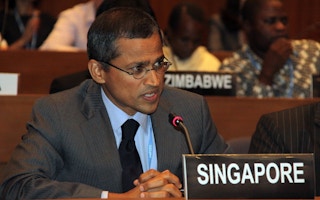To most Singaporeans, Cancun’s Green Climate Fund seems like a distant issue. The fund is being launched in order for industrialized countries to jointly mobilize US$100 billion per year by 2020 for the long-term financial support of developing countries affected by climate change. In the broad context of long term financial support from the UNFCCC (United Nations Framework Convention on Climate Change) to address mitigation and adaptation, Singapore is unlikely to be either a donor or a recipient of the fund.
Yet, most Singaporeans are unaware that the government has a key role in the fund’s development. Representing Singapore is Ambassador and Chief Negotiator for climate change, Burhan Gafoor, who sits alongside representatives of the other Asian members - Saudi Arabia, Republic of Korea, Philippines, Pakistan, India and China - of an international committee charged with designing the fund. Ambassador Gafoor is the senior director at the Ministry of Foreign Affairs, and has extensive experience in multilateral negotiations. Most recently, he was facilitator for the finance negotiations in the UNFCCC process in the lead-up to last year’s climate talks in Cancun.
The ‘Transnational Committee for the Design of the Green Climate Fund’ is made up of 40 members (15 from developed countries and 25 from developing countries) issued with the historic task of designing a fund for long-term financing to address climate change in the most vulnerable regions in the world. The success of Ambassador Gafoor and his colleagues in determining the operational elements of the fund, according to UNFCCC climate Chief Christiana Figueres,is critical to the success of this year’s climate summit in Durban.
Singapore has always taken a backseat role at international climate negotiations due to our small island status and the nature of our economy, which is newly developed and dependent on energy-intensive exports. Yet, we have pledged to reduce emissions by 16 per cent below business as usual by 2020, contingent on a legally binding agreement in which all countries implement their commitments in good faith. The former chief negotiator for climate change and current Ambassador-at-Large Chew Tai Soo says that this is a “tough target for Singapore and there will be economic and social costs to pay”.
Given these circumstances, Singapore is well-placed to encourage developing countries to undertake commitments in accordance with the principle of “common but differentiated responsibilities and respective capabilities” at the upcoming Bonn and Durban climate talks. At the same time, we should engage stakeholders and representatives from the developed world to get them to recognize the ballooning costs of further increasing per capita emissions, and to commit the time, effort and necessary investments into clean technology research and development, mitigation and adaptation in light of the urgency of climate change.
Developing countries, namely China and India, now account for approximately 26 per cent of the world’s CO2 emissions. The US Energy Information Administration (EIA) estimates that in 2035, their combined emissions may rise to 37 per cent of the world total, with China alone responsible for 31 per cent. Therefore, it is important that those governments, industry and investors pave the way for a sustainable and even profitable low carbon, climate-resilient future through sound investment and effective management of finance. China’s Weifeng Yang, of the Ministry of Finance and India’s Emeritus Professor Yaga Reddy from the University of Hyderabad are also members of the Transnational Committee for the design of the Green Climate Fund.
In their first meeting last month, members of the committee stressed the need for efficiency and effectiveness through clear accountability to ensure the fund will be responsive to the needs of developing countries. They underlined the need for good governance founded on the principles of equity, fairness, and trust. Transparency and accountability are widely touted as key success factors of last year’s talks in Cancun, which were a far cry from the disappointment of Copenhagen a year earlier.
In line with the UNFCCC’s renewed commitment to create a more open and transparent negotiating process in light of the urgency of climate change, the meetings of the Transnational Committee are open to observers. The committee looks set to make special efforts to encourage input from all sectors, particularly the private sector with its valuable insights into the design of the fund.
The world is looking on as the designers of the Green Climate Fund figure out how to get public and private capital flowing freely and transparently on the scale required to encourage and incentivize both providers and recipients of the funds to more action on both mitigation and adaptation. Beyond the Fund’s set up, it is widely hoped that it will prompt developing countries most in need of money for mitigation and adaptation to provide plans and resources to activate it.
As one of just seven members from the Asian Regional Group, Singapore, led by Ambassador Gafoor, will provide critical input into the fund’s development and establishment. A successful showing here by the Ambassador will secure Singapore a good position at the negotiating table at future UN climate talks.
All in all, Singapore looks set to play an important facilitating role to bridge the gaps between the developing and developed worlds towards the goals set out at Cancun in the lead up to Durban later this year.
The writer, Melissa Low, is an energy analyst at the Energy Studies Institute, National University of Singapore. Comments can be sent to her directly at esimlyx@nus.edu.sg.









